
The Institute for Catalan Studies, also known by the acronym IEC, is an academic institution which seeks to undertake research and study into "all elements of Catalan culture". It is based in Barcelona, Spain.
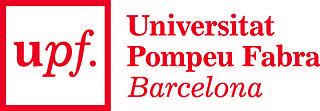
Pompeu Fabra University is a public university located in the city of Barcelona, Catalonia in Spain. The university was created by the Autonomous Government of Catalonia in 1990, and was named after Pompeu Fabra, a Catalan engineer, grammarian and the main author of the normative reform of contemporary Catalan language. In 2021, UPF was ranked the best university in Spain and 10th best young university in the world by the Times Higher Education World University Rankings.
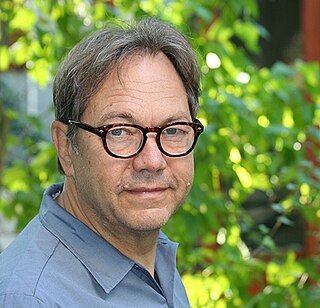
Luc Steels is a Belgian scientist and artist. Steels is considered a pioneer of Artificial Intelligence in Europe who has made contributions to expert systems, behavior-based robotics, artificial life and evolutionary computational linguistics. He was a fellow of the Catalan Institution for Research and Advanced Studies ICREA associated as a research professor with the Institute for Evolutionary Biology (UPF/CSIC) in Barcelona. He was formerly founding Director of the Artificial Intelligence Laboratory of the Vrije Universiteit Brussel and founding director of the Sony Computer Science Laboratory in Paris. Steels has also been active in the arts collaborating with visual artists and theater makers and composing music for opera.
The Spanish National Bioinformatics Institute is an academic service institution tasked with the coordination, integration and development of bioinformatics resources in Spain. Created in 2003, the INB is—since 2015—the main node through which the Carlos III Health Institute is connected to ELIXIR, a European-wide infrastructure of life science data, coordinating the other Spanish institutions partaking in the initiative such as the Spanish National Cancer Research Centre (CNIO), the Centre for Genomic Regulation (CRG), the Universitat Pompeu Fabra, the Institute for Research in Biomedicine (IRB) and the Barcelona's National Supercomputing Center.

The Spanish National Research Council is the largest public institution dedicated to research in Spain and the third largest in Europe. Its main objective is to develop and promote research that will help bring about scientific and technological progress, and it is prepared to collaborate with Spanish and foreign entities in order to achieve this aim.

The Barcelona Biomedical Research Park ("PRBB") is an agglomeration of six public research centres and is located alongside the Hospital del Mar de Barcelona. The PRBB is the product of an initiative launched by the Government of Catalonia, the City Council of Barcelona and the Pompeu Fabra University (UPF), which aims to promote research and collaboration between closely related fields. Each centre works independently in its own field and a management group, the PRBB Consortium, is responsible for managing the building and facilities, in addition to coordinating joint scientific research activities among the various centres. About 1,400 people are employed in the PRBB, making it one of the largest biomedical research clusters in the south of Europe. The centre was opened in May 2006.

The Barcelona School of Economics (BSE) is an institution for research and graduate education in economics, finance, data science, and the social sciences located in Barcelona, Spain.
Jordi Camí is Professor of Pharmacology at Pompeu Fabra University, General Director of the Barcelona Biomedical Research Park (PRBB), and Vicepresident of the Pasqual Maragall Foundation.
Albert Marcet Torrens is a Spanish economist, specialized in macroeconomics, time series, financial economics and economic dynamic theory. He is currently serving as Professor of Macroeconomics at the UCL Department of Economics, on leave from his position as ICREA Research Professor and Director of the Institute for Economic Analysis (IAE), a research centre of the Spanish National Research Council (CSIC), and AXA Research Chair on Macroeconomic Risk at the Barcelona Graduate School of Economics. He is also a Fellow of the Econometric Society and he has been a Research Fellow of Centre for Economic Policy Research (CEPR) since 1992.

Xavier Serra is a researcher in the field of Sound and Music Computing and professor at the Pompeu Fabra University (UPF) in Barcelona. He is the founder and director of the Music Technology Group at the UPF.

The Institut Barcelona d'Estudis Internacionals (IBEI) is an interuniversity research institute and postgraduate education center located in Barcelona, established in 2004 as a joint initiative between the Barcelona Centre for International Affairs and five universities in the Barcelona metropolitan area, as a center of excellence in international studies. The President of the Institute is Narcís Serra, former Minister of Defense and former Vice President of Spain, and the Director is Jacint Jordana, Professor of Political Science at the Pompeu Fabra University.
Jaume Casals Pons is the professor of philosophy at Pompeu Fabra University since 2003. He received his Doctorate in Philosophy summa cum laude from the Autonomous University of Barcelona in 1984; prior to teaching at UPF, he taught at the Autonomous University of Barcelona and Paris Diderot University.
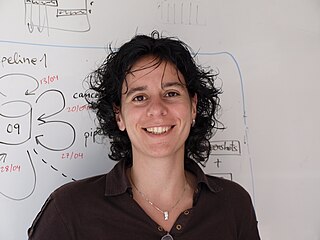
Núria López Bigas is a Spanish biologist and research professor with expertise in medical genetics, computational biology, and bioinformatics. She is an ICREA professor at Pompeu Fabra University and she also leads the Biomedical Genomics Research Group at the Institute for Research in Biomedicine in Barcelona, Spain. Her research is focused on developing computational approaches to investigate cancer genomes.

Carles Lalueza Fox is a Spanish biologist specialized in the study of ancient DNA. A doctor in Biology for the University of Barcelona, he worked in Cambridge and Oxford as well as in the private genetics company CODE Genetics of Iceland. Since 2008, he has served as a research Scientist in the Institute of Evolutionary Biology.
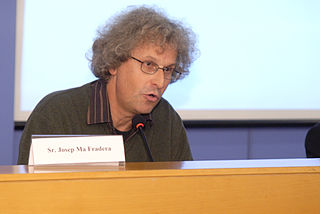
Josep Maria Fradera Barceló is a Spanish historian, professor of Contemporary History at the Pompeu Fabra University. Specialised in the colonial system of the late Spanish Empire, he has also studied the history of Catalonia.
María Paz Battaner Arias is a Spanish philologist and lexicographer. Since 29 January 2017 member of Spanish Royal Academy. She was elected on December 3, 2015 to fill the chair s, vacant since the death in 2013 of José Luis Pinillos. She has directed and published several dictionaries and carried out numerous works on the didactics of the language. Her main lines of research are lexicology and lexicography, 19th century political language, specialised language and the didactics of the Spanish language.

Daniel Oro is a Spanish ecologist working as Professor of Research at CEAB-CSIC.
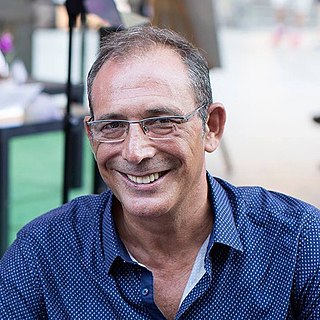
Jordi Garcia Fernàndez is a biologist whose research focuses on how the novelties present in the key evolutionary transitions arouse during metazoan evolution. He is the current vice-rector of research at the University of Barcelona, and a Honorary Research Professor at the University of Oxford.
Catia Faria is a Portuguese moral philosopher and activist for animal rights and feminism. She is a postdoctoral researcher for the Portuguese Foundation for Science and Technology at the University of Minho and is a board member of the UPF-Centre for Animal Ethics. Previously, Faria has been a lecturer in Ethics and Sustainability at Pompeu Fabra University and a visiting researcher at the Oxford Uehiro Centre for Practical Ethics.
Montserrat Bajet Royo is a professor and Spanish historian.













